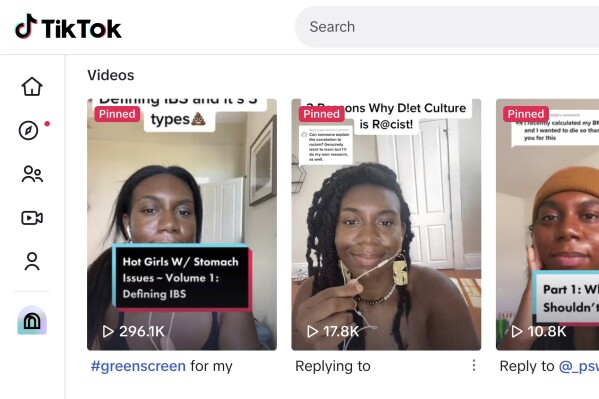After Julie Simonson survived a sexual assault, she turned to the 7-Eleven across the street for comfort food. Her weight skyrocketed, along with her shame.
"I would cope by basically overeating," the psychotherapist from Philadelphia says, recalling how her health declined in the aftermath of the attack.
Eventually she turned to gastric bypass surgery and lost 160 pounds. Simonson, 50, endured skin removal surgery, a tummy tuck and an arm lift, but the pounds slowly came back, despite her best efforts to restrict calories and work with a trainer.
Finally, in 2023, Simonson's doctor put her on Mounjaro, one of the new class of highly touted diabetes and weight-loss drugs, and the pounds finally came off and stayed off. She says she feels amazing.
But beneath Simonson's joy, she's found a darker side to living at a healthy weight—people are treating her like a celebrity, even though she's the same person she's always been.
"My interests haven't changed. My sense of humor hasn't changed. Fundamentally who I am hasn't changed," Simonson says indignantly. "That's why it's frustrating when people are nicer to me because I'm not really any different."
As tens of millions of Americans reap the benefits of new obesity therapies, some are finding a bitter confirmation of the fatphobia they've experienced all their lives—and are grappling with how to deal with their own, internal bias now that they're "on the other side."
It's yet another aspect of a new health and weight revolution powered by a class of drugs called GLP-1 agonists, which include Ozempic and Wegovy, that are reshaping American society.
As many Americans lose weight to improve their health, their old bodies—and memories of past mistreatment—continue to cast a shadow over them.
They're learning all over, in a new way, how awful neighbors, co-workers and strangers can be.
"People start to see that people are treating them differently than they were before, which can make people feel distressed and upset because they are the same person," says Rebecca Puhl, professor of human development at the University of Connecticut.
The new behavior patients experience after rapid, serious weight loss illuminates the bias they suffered before treatment.
Compliments aren't always good experiences for people adjusting to a smaller body because it shows they are not being recognized for their kindness, their talents, their contributions to society or their character.
They are being valued by others solely for their appearance and their adherence to society's sometimes misguided views on what is healthy, which too often conflates thinness with health.
Lauri Barnes, a court reporter from Charleston, South Carolina, recalls the particularly painful experience of a gang of boys taunting her, mooing like cows, as she walked to her car from the grocery store.
"That made me feel just awful," says Barnes, 59.
Since losing weight, she says she feels like a hypocrite for her thoughts.
"When I was over 300 pounds, I had a lot of empathy for people who were heavy because I understood—I was there," says Barnes. "I know it's a terrible thing to say, but now when I see somebody who's heavy like I was, I think, 'Why aren't you going to your doctor and getting help because you don't have to be like this?'"
Experts call this common reaction to an internal bias "residual stigma."
"People are so heavily stigmatized by their weight that when they lose weight, they still feel that stigma," says Puhl. "Either because they've internalized the shame and that doesn't go away, or they feel stigmatized for how they lost the weight"—through medication, rather than exercise and diet alone.
It's even harder for women to lose weight—for whatever reason and by any method—in a predominantly fatphobic society that so often worships at the altar of skinny privilege.
"If women are even a little bit heavier than what's considered our arbitrary ideal, then it's, 'Can you believe it? She's so fat,'" says Abigail Saguy, professor of sociology at UCLA. "Women are walking a narrow tightrope of what's considered acceptable and healthy and are subject to much scrutiny."
Jeni Morgan, a veterinary assistant in Vancouver, Washington, went to fat camp at age 12, even though her weight was normal. Now 39, Morgan says the experience led to body dysmorphia, followed by weight gain.
As an adult, she found community with the body positivity movement and didn't think her weight made any impact on her life—until she lost 100 pounds.
"Suddenly I noticed girls wanted to hang out with me more," Morgan says. "People started treating me like I was really cool. They liked me even though only my weight had changed."
A part of the Portland punk and metal scene, Morgan was shocked when a musician she had never spoken to asked her how she was doing. "He didn't even know my name. I found it really off-putting and felt uncomfortable by it," Morgan says.
"That's when I realized how much being more conventionally attractive made a difference," Morgan says.
When people flock to the "new you," what does that say about their prejudices?
"People who are viewed to be conforming more to societal ideals of physical attractiveness, which typically equates with thinness, are perceived to be more desirable, successful, attractive, popular or likable," Puhl says.
Lynn, a petite New York City psychoanalyst, is nearing 60 and says younger men routinely approach her since she lost 85 pounds.
"It is a rare occasion when somebody doesn't hold the door open for me or is courteous to me now," said Lynn, who asked to be identified only by her first name for professional reasons. "I used to have doors literally shut in my face when I was fat."
Lynn, who once worried about fitting into airplane seats, is regularly upgraded. "Everyone is palpably nicer to me," she says. "People open doors, look me in the eye and express interest in a way that was the complete opposite of when I was heavy. I'm now socially acceptable."
She says this kind of skinny privilege messes with her thinking; when she sees someone with obesity, she consciously curtails the kind of thoughts people once voiced toward her when she was bigger.
"What I did for myself may not be what everyone else wants," says Lynn, who still wrestles with internalized fatphobia.
Lynn says she feels like she's masquerading every day. She looks in mirrors, glass windows— constantly checking to see that she's still "normal."
Sometimes the messages we tell ourselves end up becoming a broken record of repetitive negative thoughts. Experts suggest combating this residual stigma by engaging in positive self-talk and replacing critical comments with more self-compassion.
If the stigma comes from relationships with family members or friends, experts say it's important to talk about those experiences with them and explain how the comments are hurtful.
Simonson recently visited with friends and family who hadn't seen her in a while. She says she was harangued with questions about her weight loss, how she did it, how much she lost and other comments about her body.
"The reaction I've been getting nonstop to my appearance is so uncomfortable I want to crawl out of my skin," she says.
Simonson later told a close friend about the experience, who validated her feelings. "I'm sure most people would be horrified to know they made you feel bad with their compliments," she texted Simonson.
"I see the bias in myself," says Lynn, who once Photoshopped her headshot to appear thinner. "I feel like I'm hiding an ugly part of myself. I fight it every day."
Request Reprint & Licensing Submit Correction View Editorial GuidelinesAbout the writer
Emily FaracheDisclaimer: The copyright of this article belongs to the original author. Reposting this article is solely for the purpose of information dissemination and does not constitute any investment advice. If there is any infringement, please contact us immediately. We will make corrections or deletions as necessary. Thank you.




